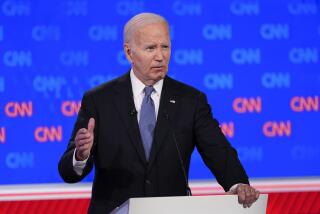Biden lunch stop stirs up sales at Beijing eatery
- Share via
Reporting from Beijing — He didn’t order the signature bowl of hog guts, but Vice President Joe Biden’s stop last week for lunch at a Beijing eatery during his state visit has proved a boon for the family-owned business.
Diners have been lining up outside Yaoji Chaogan, reportedly waiting as long as an hour for a table at the no-frills restaurant, which specializes in pork liver and intestine soup.
“Usually there aren’t so many people at this time, and you can get a table quickly. But customers began to gather all day long after Biden’s visit,” a 76-year-old regular customer told the Global Times.
Calls to the restaurant by The Times went unanswered Monday.
Some customers have been asking for the “Biden set” — steamed meat buns, smashed cucumber salad and noodles topped with soy bean paste — according to the Beijing Evening News.
The vice president was lauded in state media for his “noodle diplomacy” in visiting the working-class establishment. Food is central to Chinese culture. Even what you eat for lunch says a great deal about who you are.
His everyman gesture came days after a photograph of U.S. Ambassador to China Gary Locke carrying a backpack and buying his own coffee at Seattle-Tacoma International Airport went viral here. Online commentators expressed surprise — and some admiration — that a high-ranking U.S. official would perform these humble tasks. Chinese leaders, who consider such chores beneath them, employ assistants to fetch and carry.
Biden’s $12 meal also set off discussion about rising food prices that have pushed inflation here to a three-year high.
“How long can the price Biden enjoyed last?” asked a micro-blogger named Yupi.
An editorial in the Global Times on Sunday said the vice president’s affordable meal painted an outdated picture of China, where the cost of living is rising fast.
“China used to be the low-cost paradise for multinational companies, having won the name of the world’s manufacturing factory,” wrote John Gong, an associate professor at the University of International Business and Economics in Beijing. “But things have changed greatly over the years, as the yuan appreciated and the domestic wage levels climbed.
“Today the low-cost manufacturing value proposition is all but a myth, and if this trend continues, before long the country will soon wake up to see that it doesn’t have much of a competitive advantage anymore in world markets.”
All this from a bowl of noodles.
More to Read
Inside the business of entertainment
The Wide Shot brings you news, analysis and insights on everything from streaming wars to production — and what it all means for the future.
You may occasionally receive promotional content from the Los Angeles Times.











